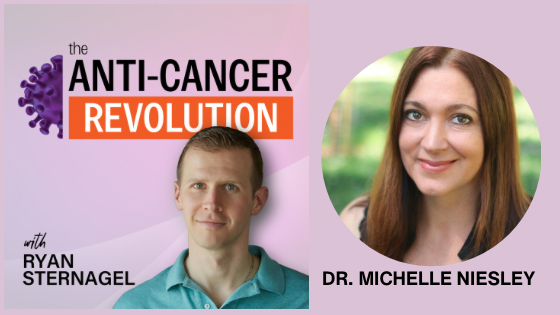
Survivorship, Supplement Strategy, Genomics: Michelle Niesley & Ryan Sternagel
Podcast: Play in new window | Download
Dr. Michelle Niesley, a naturopathic doctor with extensive experience in oncology, emphasizes the importance of integrative care for cancer survivors, especially children. In this insightful interview, she shares her expertise on how strategic supplementation during and after treatment can safeguard patients’ health.
Dr. Niesley discusses the significance of genomic testing in detecting long-term health risks and the thoughtful use of diet and supplements to support the immune system during chemotherapy. She also touches on the specific needs of high-risk neuroblastoma patients, advocating for a tailored approach that includes dietary modifications and innovative integrative support techniques.
Her collaborative approach to care, coupled with a deep dive into the potential of polyamine restriction and the benefits of compounds like genistein, showcases her commitment to enhancing survivorship and quality of life.
This comprehensive interview is a must-read for anyone seeking to understand the nuances of naturopathic oncology care and the potential for personalized treatment strategies in improving outcomes.
*******Get every full two hour call in Going Integrative Plus and ask your questions live directly to the top integrative cancer doctors in the world!********
Resources Mentioned
- Dr. Niesley’s website
- Pacific Integrative Oncology
- Chemo & Crayons
- CoQ10 supplement
- L-carnitine supplement
- Probiotics
- Medicinal Mushrooms
- Ashwagandha
- Astragalus
- Vitamin D
- Vitamin A
- Elderberry extracts
- Larch arabinogalactan
- Mistletoe extract
- Amino acids
- Protein powders
- Genistein
Professional Background of Dr. Michelle Niesley
- Naturopathic doctor since 2001 with a residency at an integrative cancer hospital.
- Holds a Master’s in Biostatistics and Epidemiology from Dartmouth.
- Experience in adult and pediatric oncology and survivorship, emphasizing patient health during and post-treatment.
Focus on Survivorship and Healthy Practices
- Dedicated to helping families with post-cancer treatment care, particularly in children.
- Addresses potential contributors to cancer such as environmental factors and genetics.
- Aims to prevent early onset of chronic conditions commonly seen in older adults, like high blood pressure or diabetes, which can appear prematurely in pediatric cancer survivors.
Supplement Use During and After Cancer Treatment
- Recommends consistent use of supplements during active treatment to protect against side effects (e.g., heart protection during Adriamycin chemotherapy with CoQ10 or L-carnitine).
- Supports taking breaks from supplements for patient sanity, especially in survivorship.
- Practices rotating supplements (e.g., different probiotics or herbs) to provide variety to the body.
Perspective on Circulating Tumor Cell (CTC) Tests
- Skeptical about the current effectiveness of CTC tests in predicting cancer relapse.
- Prefers not to use tests that won’t immediately influence clinical decisions.
Importance of Genomic and Microbiome Testing
- Finds genomic testing crucial for identifying issues such as methylation defects and vitamin absorption problems.
- Values stool and microbiome testing, especially post-chemotherapy, to assess and address the impact on digestive tract health and immunity.
Food Sensitivity and Allergy Testing
- Conducts food sensitivity testing to identify delayed hypersensitivity reactions.
- Advises against testing during allergy medication or steroid use due to potential false negatives.
Lab Utilization and Genomic Data Concerns
- Uses various labs for testing, including U.S. Biotech, Great Plains, Genova Diagnostics, and Labrix.
- Notes the changes in available genomic data from services like 23andMe and the shift towards using other platforms or dedicated testing services.
- Discusses patient concerns regarding genetic data privacy, potential misuse by insurance companies, and the fear of discrimination based on genetic predisposition to diseases.
Approach to Post-Cancer Treatment Testing
- Dr. Niesley is selective about testing, preferring to address obvious issues like gut health directly before employing extensive tests.
- Believes in using tests to identify overlooked issues rather than as an initial blanket approach.
- Advises against immediate detox post-chemotherapy, suggesting a 30-day period for natural recovery before starting detoxification.
Pediatric Oncology and Clinical Trials
- Explains the complexity of using supplements like mistletoe and IV vitamin C in pediatric patients, especially those in clinical trials.
- Clinical trials in pediatric oncology have led to significant advancements in treatment and survival rates.
- Emphasizes the need for systematic approaches in treatment to continue improving long-term survival.
Supplement Use with Regard to Chemotherapy and Immune System
- Recommends spacing supplements around chemotherapy schedules to avoid interference.
- Suggests using immune-supportive supplements like astragalus, ashwagandha, vitamin D, and vitamin A outside of chemotherapy weeks.
- Advises against using mushroom extracts during chemotherapy for blood cancers, instead opting for alternatives that support the immune system without stimulating malignant cells.
Strategic Supplement and Dietary Support
- Advocates for the careful selection of supplements and dietary changes that have multiple health benefits.
- Stresses the importance of bone health, especially in patients on steroids, recommending vitamin D supplementation.
- Recommends working closely with a qualified naturopathic doctor for personalized care.
Dietary Considerations for Neuroblastoma
- Polyamine restriction is discussed, with particular emphasis on its relevance for high-risk neuroblastoma patients, especially those with NMIC amplification.
- For intermediate-risk patients doing well, polyamine restriction may not be as crucial but is still considered.
- Polyamine avoidance is increasingly prioritized in integrative therapy plans for neuroblastoma.
Integrative Support for High-Risk Neuroblastoma
- Discusses the importance of comprehensive integrative support for high-risk children, emphasizing the need to maintain overall health during treatment.
- Considers the use of high-dose vitamin C and other IV therapies for additional support.
- Genistein, derived from soy, is mentioned as having beneficial properties supported by research in various cancers.
Collaborative Care Approach
- Advocates for creating a robust integrative care team to manage symptoms and support overall health during cancer treatment.
- Emphasizes the value of having multiple sources of information and support, rather than relying on a single provider.
********Get every full two hour call in Going Integrative Plus and ask your questions live directly to the top integrative cancer doctors in the world!*********
No Comments
Be the first to start a conversation